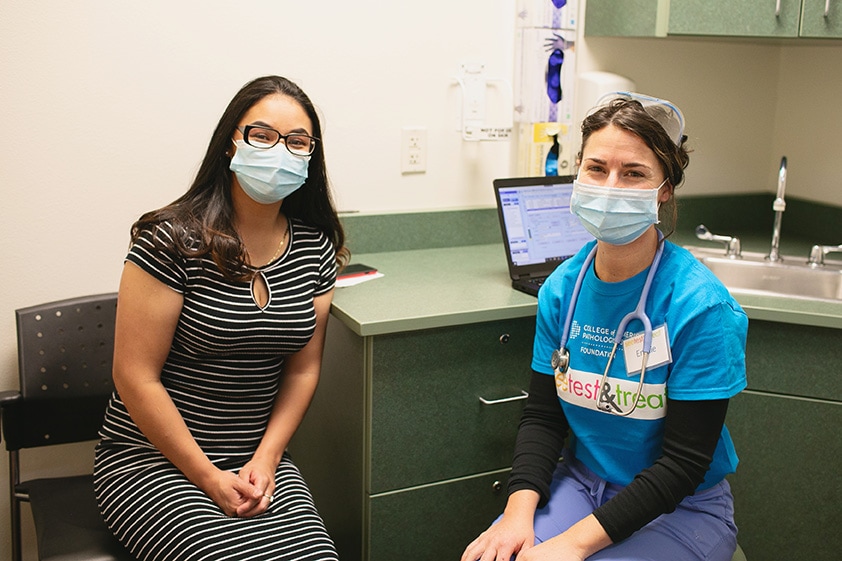Looking for NAHEC? Welcome to Our New Home.
We've rebranded! Northern Arizona Area Health Education Center (NAHEC) is now Colorado Plateau Center for Health Professions. Learn more.
Healthcare research historically excludes medically underserved communities, resulting in healthcare recommendations that don’t necessarily work for everyone. We support community-based research to benefit our communities and patients.
Benefiting Our Community

North Country HealthCare and the Colorado Plateau Center for Health Professions are proud to support and participate in research and quality improvement (QI) projects that benefit our patients and communities. Engaging in these types of projects helps to improve our quality of care to our patients and helps us better understand the unique circumstances that affect individuals and communities across northern Arizona.
We facilitate projects from a range of different types of investigators, including medical students, residents, employees, and external researchers from both academic and research institutions. As an organization whose primary focus is education and training, our goal is to engender a supportive environment that incorporates research mentorship and takes an active role in student and resident-led projects.
What's the difference?
Take a Quiz
If you’re unsure about whether your project is a research or a quality improvement project, take this quick quiz to find out!
If you’re still unsure after taking this quiz, contact us so we can help you determine if your project is a research or quality improvement project.
Take a Quiz
If you’re unsure about whether your project is a research or a quality improvement project, take this quick quiz to find out!
If you’re still unsure after taking this quiz, contact us so we can help you determine if your project is a research or quality improvement project.
Find Answers
We hope you’ll find the answers to the most commonly asked questions we receive. If you have a question that isn’t listed here, use this form to contact us.
Research: Research is a systematic investigation, including development, testing, and evaluation designed to test novel hypotheses and develop or contribute to scientific knowledge.
Quality Improvement: Quality Improvement (QI) is a systematic, cyclical process that evaluates how an organization works and how to improve its processes. QI projects involve identifying and describing workflows or other organizational processes, developing a methodological plan for collecting data or proposing an intervention, and evaluating the outcomes in order to learn, implement, and revise solutions.
Research projects often involve human-subjects components, where patients or patient data may be used to evaluate the project hypothesis. Research projects also typically have a larger scope or are being conducted with the intent of publishing or presenting publicly. A formal assessment and review of study details helps us protect our patients and their data adequately, and it allows us to have a more stringent oversight of timelines and methodology, as they may directly impact our patients’ security and wellbeing. QI projects, on the other hand, are internal assessments and improvements of workflows, and there is rarely a direct risk to patients or their data.
Yes, due to COVID-19 and our efforts towards vaccination, our clinical teams do not have the same capacity to participate in research as they have had in the past. Therefore, we are requiring that clinical research projects be relatively small and extremely feasible, and, preferably, have a clinical PI or other North Country stakeholder involved or consulted during the design phase. If your project involves impractical or burdensome components for our clinical staff or clinical resources, North Country may simply deny supporting the project.
A vetted QI project is one that has been rudimentarily designed and approved by our Continuous Quality Improvement (CQI) Committee. This means that a project topic, scope, timelines, and outcomes have been selected, along with a contact individual and/or preceptor who can help guide the project and be involved throughout the process. These projects are designed to address one of our highest priority areas for improvement and are preferred QI projects that North Country would like to see being conducted. An unvetted QI project is simply a project that has not undergone this process by our CQI Committee. While this does not mean that unvetted QI projects won’t be supported, we would prefer these to be relatively small in scope so as not to take away staff time or resources from projects that address high priority areas.
For research projects, there are deadlines that need to be adhered to, and the research application deadline calendar outlines these specific dates for monthly review. There are no application deadlines for QI projects.
At the very minimum, just the completed and detailed application is required for it to be formally reviewed. Depending on the type of project you are proposing, you may also need to provide documentation of approval or exemption from an IRB.
If you have any questions about research or QI at North Country, please contact the Education Director Marica Martinic.


2920 N. 4th Street
Flagstaff, AZ 86004



